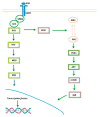KRAS: A Druggable Target in Colon Cancer Patients
- PMID: 35456940
- PMCID: PMC9027058
- DOI: 10.3390/ijms23084120
KRAS: A Druggable Target in Colon Cancer Patients
Abstract
Mutations in KRAS are among the most frequent aberrations in cancer, including colon cancer. KRAS direct targeting is daunting due to KRAS protein resistance to small molecule inhibition. Moreover, its elevated affinity to cellular guanosine triphosphate (GTP) has made the design of specific drugs challenging. Indeed, KRAS was considered 'undruggable'. KRASG12C is the most commonly mutated variant of KRAS in non-small cell lung cancer. Currently, the achievements obtained with covalent inhibitors of this variant have given the possibility to assess the best therapeutic approach to KRAS-driven tumors. Mutation-related biochemical assets and the tissue of origin are expected to influence responses to treatment. Further attempts to obtain mutant-specific KRAS (KRASG12C) switch-II covalent inhibitors are ongoing and the results are promising. Drugs targeted to block KRAS effector pathways could be combined with direct KRAS inhibitors, immunotherapy or T cell-targeting approaches in KRAS-mutant tumors. The development of valuable combination regimens will be essential against potential mechanisms of resistance that may arise during treatment.
Keywords: KRAS oncogene; RAS pathway; adagrasib; colon cancer; sotorasib; targeted therapy.
Conflict of interest statement
The authors declare no conflict of interest.
Figures
References
Publication types
MeSH terms
Substances
LinkOut - more resources
Full Text Sources
Medical
Miscellaneous




